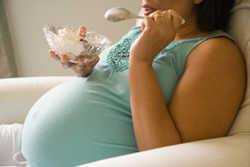Health authorities have recently issued warnings for listeriosis (infection with listeria bacteria) which can be a serious risk for pregnant women.

Listeriosis is usually caught from contaminated food. It is generally a mild infection causing fever, headache, muscle aches and tiredness.
However those at high risk, such as pregnant women, those with a weakened immune system and older people, can develop septicaemia (blood poisoning), meningitis (brain infection) and even death. In pregnancy, it can also cause miscarriage, premature birth and stillbirth.
How to reduce your risk of listeriosis
Follow these rules to reduce your risk of infection:
-
- Cook food thoroughly to kill the bacteria.
- Eat freshly cooked or freshly prepared foods.
- Refrigerate leftovers promptly and eat within a day.
- Reheat foods to ‘steaming hot’ to kill the bacteria.
- When eating out, order hot meals and avoid smorgasbords and salad bars.
These foods are at higher risk of contamination and are best avoided by pregnant women and others at risk:
| Food type | Examples |
| Cold meats | Unpackaged ready-to-eat from delicatessen counters, sandwich bars etc. Packaged, sliced, ready to eat |
| Cold cooked chicken | Purchased (whole, portions or diced) ready-to-eat |
| Pate | Refrigerated pate or meat spreads |
| Salads (fruits and vegetables) | Pre-prepared or pre-packaged salads e.g. from salad bars, smorgasbords etc |
| Chilled seafood | Raw (e.g. oysters, sashimi or sushi) Smoked ready-to-eat Ready-to-eat peeled prawns (cooked) e.g. in prawn cocktails, sandwich fillings and prawn salads |
| Cheese | Soft, semi-soft and surface ripened cheeses (pre-packaged and delicatessen) e.g. brie, camembert, ricotta, feta and blue |
| Ice cream | Soft serve |
| Other dairy products | Unpasteurised dairy products (e.g. raw goat’s milk) |
Disclaimer:
-
-
- Please note this information was correct at time of publication.
- For up to date information, speak to your doctor.
-

